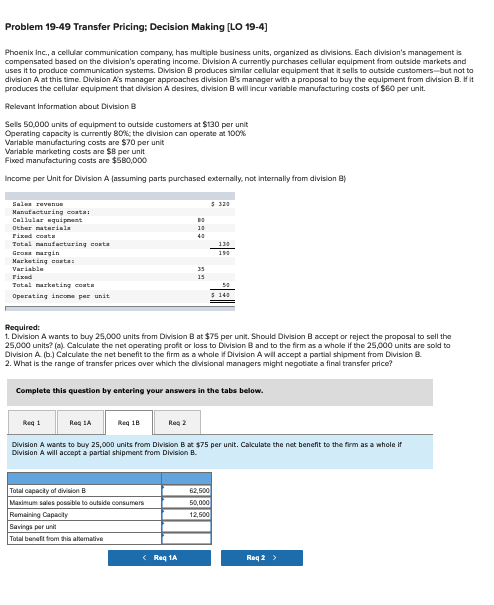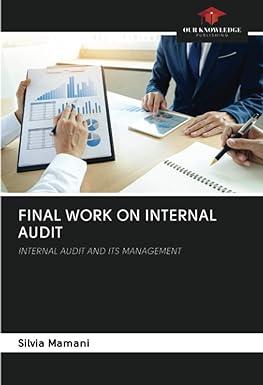Question
Phoenix Inc., a cellular communication company, has multiple business units, organized as divisions. Each divisions management is compensated based on the divisions operating income. Division
Phoenix Inc., a cellular communication company, has multiple business units, organized as divisions. Each divisions management is compensated based on the divisions operating income. Division A currently purchases cellular equipment from outside markets and uses it to produce communication systems. Division B produces similar cellular equipment that it sells to outside customersbut not to division A at this time. Division As manager approaches division Bs manager with a proposal to buy the equipment from division B. If it produces the cellular equipment that division A desires, division B will incur variable manufacturing costs of $60 per unit.
Relevant Information about Division B
Sells 50,000 units of equipment to outside customers at $130 per unit
Operating capacity is currently 80%; the division can operate at 100%
Variable manufacturing costs are $70 per unit
Variable marketing costs are $8 per unit
Fixed manufacturing costs are $580,000
Income per Unit for Division A (assuming parts purchased externally, not internally from division B)
| Sales revenue | $ | 320 | ||||
| Manufacturing costs: | ||||||
| Cellular equipment | 80 | |||||
| Other materials | 10 | |||||
| Fixed costs | 40 | |||||
| Total manufacturing costs | 130 | |||||
| Gross margin | 190 | |||||
| Marketing costs: | ||||||
| Variable | 35 | |||||
| Fixed | 15 | |||||
| Total marketing costs | 50 | |||||
| Operating income per unit | $ | 140 | ||||
Required:
1. Division A wants to buy 25,000 units from Division B at $75 per unit. Should Division B accept or reject the proposal to sell the 25,000 units? (a). Calculate the net operating profit or loss to Division B and to the firm as a whole if the 25,000 units are sold to Division A. (b.) Calculate the net benefit to the firm as a whole if Division A will accept a partial shipment from Division B.
2. What is the range of transfer prices over which the divisional managers might negotiate a final transfer price?
I only need part 1B Down below in the image:

Problem 19-49 Transfer Pricing: Decision Making [LO 19-4) Phoenix Inc., a cellular communication company, has multiple business units, organized as divisions. Each division's management is compensated based on the division's operating income. Division A currently purchases cellular equipment from outside markets and uses it to produce communication systems. Division B produces similar cellular equipment that it sells to outside customers-but not to division A at this time. Division As manager approaches division B's manager with a proposal to buy the equipment from division B. Mit produces the cellular equipment that division A desires, division B will incur variable manufacturing costs of $60 per unit. Relevant information about Division B Sels 50.000 units of equipment to outside customers at $130 per unit Operating capacity is currently 80%; the division can operate at 100% Variable manufacturing costs are $70 per unit Variable marketing costs are SB per unit Fixed manufacturing costs are $580,000 Income per Unit for Division A assuming parts purchased externally, not internally from division B) 10 Sales revenue Marrotacturing conta: Cellular equipment other materials Fixed out Total manufacturing conta Groet margin Marketing conta Variable Fixed Total marketing coutu Operating income per unit 130 190 15 50 Required: 1. Division A wants to buy 25,000 units from Division B at $75 per unit. Should Division B accept or reject the proposal to sell the 25,000 units? (al Calculate the net operating profit or loss to Division B and to the firm as a whole of the 25,000 units are sold to Division A. (6.) Calculate the net benefit to the firm as a whole of Division A wil accept a partial shipment from Division B. 2. What is the range of transfer prices over which the divisional managers might negotiate a final transfer price? Complete this question by entering your answers in the tabs below. Req1 RIA Reg 1B Reg2 Division A wants to buy 25,000 units from Division B at $75 per unit. Calculate the net benefit to the firm as a whole if Division A will accept a partial shipment from Division B. Total capacity of division B Maximum sales possible to outside consumers Remaining Capacity Savings per unit Total benefit from this alomative 82,500 50,000 12,500
Step by Step Solution
There are 3 Steps involved in it
Step: 1

Get Instant Access to Expert-Tailored Solutions
See step-by-step solutions with expert insights and AI powered tools for academic success
Step: 2

Step: 3

Ace Your Homework with AI
Get the answers you need in no time with our AI-driven, step-by-step assistance
Get Started


